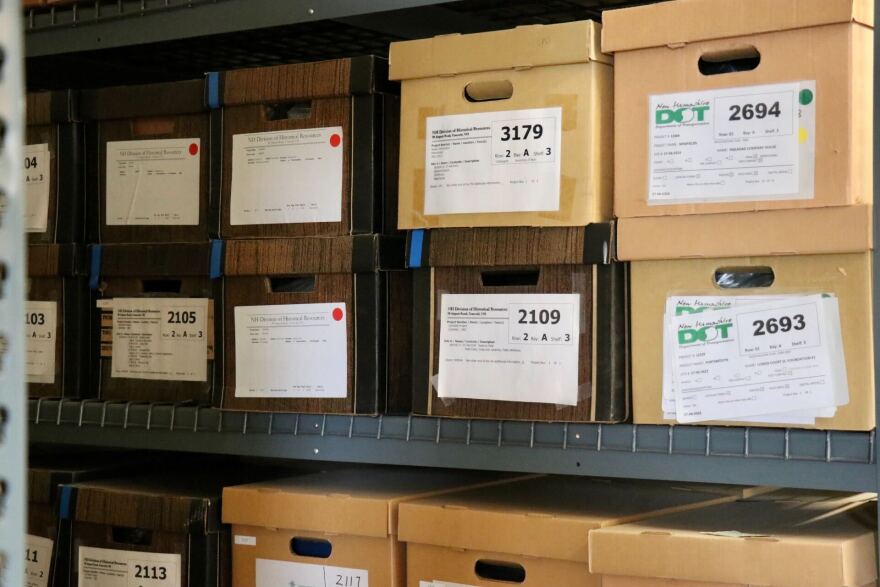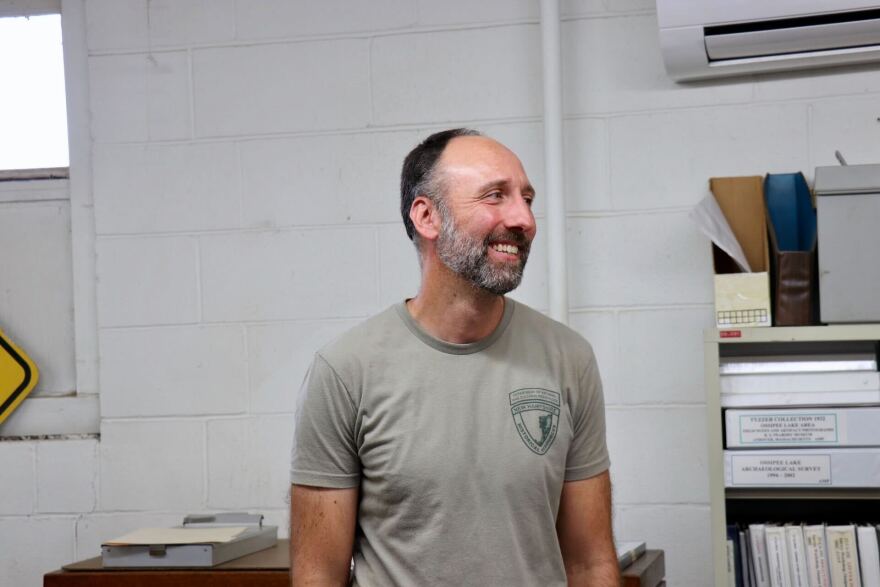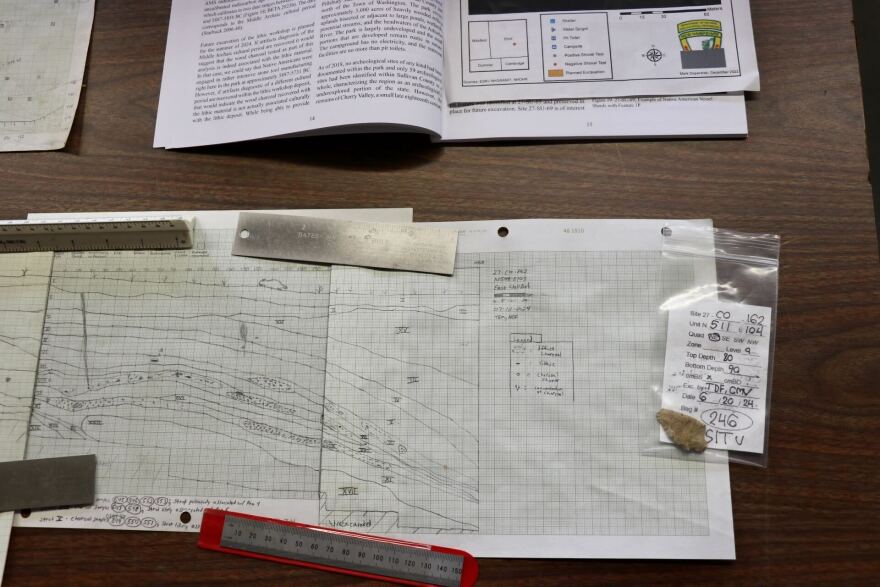Tucked away on Airport Road in Concord is an unassuming building. There are no windows from the front. It has a gray metal door, and inside are rows upon rows of Bankers Boxes filled with finds from decades of archaeological digs in New Hampshire.
“A lot of people come in here like, ‘Oh, it’s like X-Files or a government building where there’s just box after box after box on a shelf.’ And that’s a pretty apt description,” said New Hampshire’s state archaeologist Mark Doperalski.

Hundreds of boxes of archaeological finds are stored at the Airport Road facility in Concord.
Each of those boxes stores one or more artifacts from all over the state, bucking what Doperalski says is a common mentality in the United States: that archaeological digs here don’t render valuable artifacts.
“[People will] ask you, ‘Well, what do you do for a living right now?’ And you tell them you’re an archeologist and they’ll say, ‘Well, where do you work? Egypt? Down in Mesoamerica?’” Doperalski said. “But it surprises some folks to learn that we actually have a lot of archeological resources right here.”
Not yet cataloged away are some recent finds from a four-year project at Mollidgewock State Park. They’re items left behind by Abenaki people, some more than 7,000 years old.
They’re laid out on a table, cataloged with all the pertinent information: dates, location, contents. There are stone fragments thought to be from a kind of workshop where people used to make stone tools. There’s also a “projectile point,” or what some might call an arrowhead.
These would’ve come from Abenaki people who settled in an area with flat ground, access to water, and maybe even a good view. The dig site is now a campground, and Doperalski says that’s part of why he was motivated to look there.

Mark Doperalski is New Hampshire’s state archaeologist.
“Things like that that we find attractive today were the same areas, for the most part, that were attractive to past populations,” Doperalski said.
For the dig, Doperalski worked alongside a team of around 20 volunteers from SCRAP. That’s the State Conservation and Rescue Archaeology Program. He says it attracts people from all walks of life, from recent college graduates to retirees.
They camp out together at the work sites, making meals over the fire and falling asleep to the sounds of insects or nearby rivers. Some of the younger volunteers have even expanded Doperalski’s vocabulary.
“Of course the younger kids will roll their eyes when you start using their slang, but it’s fun,” Doperalski said.
When it comes to those young people, Doperalski says field work is important, as more universities are closing down their archaeology programs.
“It’s kind of a trend nationwide,” Doperalski said. “Less and less opportunities for that.”
The SCRAP volunteers were outside for weeks on end, helping to dig, clean and catalog the artifacts from Errol. During the dig, Doperalski reached out to an Abenaki First Nation in Canada to share what he found.Abenaki leaders and Doperalski agreed the artifacts should be accessible to the public so people can learn about the history of the area and its people. Mollidgewock State Park has a new visitor’s center in the works where Doperalski plans to display the SCRAP team’s findings.

SCRAP volunteers drew a detailed map of the excavation area in Errol.
“Working in the state parks offers the opportunity to try and get some of those artifacts and some of that interpretation back out to the public at the place it was discovered,” Doperalski said. “I think that’s a really important thing. I think it’s a powerful thing to be able to learn about the past at the place that it happened.”
That display would be the culmination of over four years of slow, calculated, sometimes tedious work. Doperalski says the field of archaeology is a little misrepresented in film. In reality, it requires a lot of patience.
“Indiana Jones never really did paperwork,” Doperalski said. “I mean, he had that little journal, but other than that, I never really saw him doing paperwork. I never saw him drawing out maps or sketches of the wall profiles or honestly, really excavating in a standardized method.”
Even though Doperalski isn’t escaping rolling boulders or viper pits, he says the exciting possibilities for archaeological work in New Hampshire are pretty much endless, from the upper layers of soil that hold our most recent history, to those that date back thousands of years. He says he hopes it’s something he’ll be doing for a long time.
“My predecessor, when I took this job, said, ‘Hey, the state of New Hampshire is your sandbox,’” Doperalski said. “That’s the way he categorized it for me. It’s largely true. It’s a very fulfilling job.”
The visitor’s center in Errol is scheduled to open in the fall of 2025.
Source link : http://www.bing.com/news/apiclick.aspx?ref=FexRss&aid=&tid=66d007bb12d74a14ab6a6262c8e40b7f&url=https%3A%2F%2Fwww.nhpr.org%2Fnh-news%2F2024-08-28%2Fnew-hampshire-is-your-sandbox-state-history-lies-below-the-surface-in-errol&c=12436879623609076351&mkt=en-us
Author :
Publish date : 2024-08-28 10:07:00
Copyright for syndicated content belongs to the linked Source.
